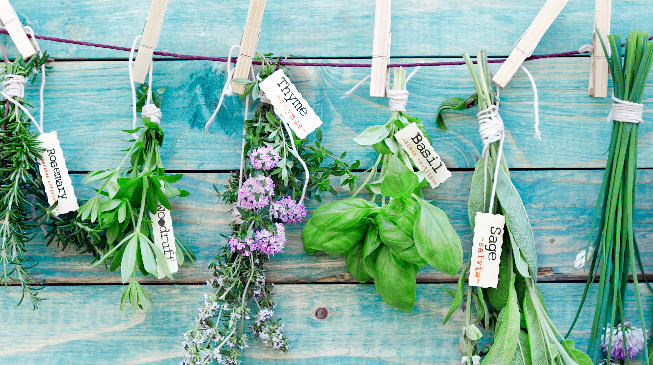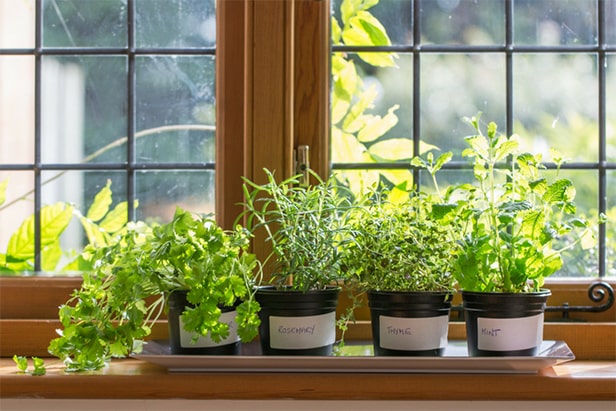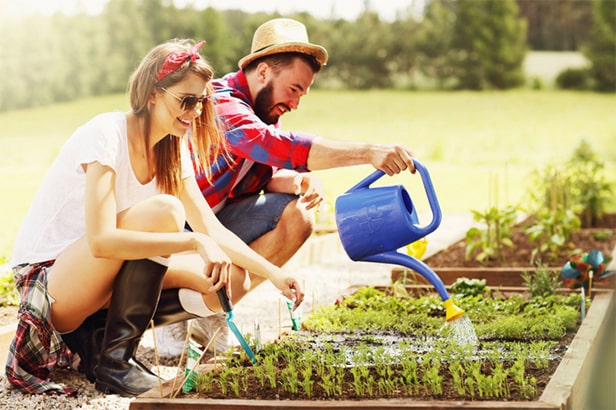Grow Your Own Herb Garden
Spring has arrived, and we are already seeing new buds on trees and beautiful flowers sprouting up through grass. Spring is a perfect opportunity to have your very own herb garden and below is a step-by-step guide to help you create your own.

1. Grow Herbs With your Family for More Fun
Growing your own herbs is not only an enjoyable hobby, but a great way to save on your shopping bill and add new flavours to your meals. There is something very rewarding about enjoying the results of your dedication and hard work. If you have children, it is also a great way to get them out in the garden helping. Why not even let them grow their own dedicated patch of herbs to learn about science and the importance of helping plants grow.
2. Find a Suitable Space for Your Herb Garden
 You can grow your own herbs in your garden, on your porch or even in your kitchen. One of the great benefits of growing herbs is that you can grow them in small spaces and grow as much (or as little) as you would like.
You can grow your own herbs in your garden, on your porch or even in your kitchen. One of the great benefits of growing herbs is that you can grow them in small spaces and grow as much (or as little) as you would like.
The only thing to remember is that herbs should, ideally, be grown in a sunny, sheltered location with well-drained soil. Find a suitable space in your home or garden for growing herbs and nourish them with suitable tools. For instance, you will need herb plants or seeds, containers, sharp pruning scissors, a small watering can and a hand operated transplanter or spade to help you grow herbs you can be proud of. Many of these items can be picked up in your local hardware or DIY store.
3. Start with Great Quality Seeds and Plants
If you have never grown herbs before you might be interested in planting pre-potted herbs. You can buy great quality starter plants from a reputable garden centre. If you fancy the challenge of growing your own from seeds, gather a few yoghurt pots or old, cleaned milk cartons and fill with moist, peat-free compost. Sprinkle a few seeds - include a mixture of variations if you wish - and cover with a loose layer of compost. Wrap the top of the carton with cling film to create a suitable micro climate for germination which works a little like a greenhouse. After 4 -5 weeks you will notice that the seeds have developed their first proper leaves, and this is now an indicator that it’s time to transplant them into separate pots to fully grow.
4. Grow Herbs in Your Kitchen
If you don’t have a lot of room, a good idea is to grow herbs that you will use constantly in smaller amounts for cooking. Your options might include oregano, basil and rosemary which you can pick in small bunches as you need them, and they will quickly grow back. If growing inside, find a sunny, spacious place for the herbs to grow in a suitable sized pot.
5. Grow herbs outside
If you have more room, such as a garden or dedicated herb plot, grow your herbs in well-drained soil with a mixture of one-part sand to four-parts compost. Make sure you keep the compost moist but make sure you don’t over-water. Herbs better suited to outside growing are hardy annual herbs which re-grow every year. These include dill, coriander, parsley and mint.
6. Use Terracotta Pots if You Can
When growing herbs, it is really important that your herbs can drain properly so they don’t drown. If you can, use terracotta pots because they are heavy - meaning they will be stable and porous, so they won’t suffocate the soil.
7. Water Your Herbs Every Day
 Make sure you give your herbs enough water to grow, ideally every day. In the warmer summer months, it’s better to water in the evening rather than in the full heat of the day. To check if your herbs need watering, put your finger into the pot and if the soil is dry an inch below the surface… it’s time to water. If you are growing your herbs in a pot, you can pour water on a plate or saucer and the soil will soak it up throughout the day. You might be interested in a self-watering herb pot such as the Eva Solo product which soaks up water via nylon threads as your herbs need moisture.
Make sure you give your herbs enough water to grow, ideally every day. In the warmer summer months, it’s better to water in the evening rather than in the full heat of the day. To check if your herbs need watering, put your finger into the pot and if the soil is dry an inch below the surface… it’s time to water. If you are growing your herbs in a pot, you can pour water on a plate or saucer and the soil will soak it up throughout the day. You might be interested in a self-watering herb pot such as the Eva Solo product which soaks up water via nylon threads as your herbs need moisture.
8. Prune your herbs frequently
It is important to keep your herbs well-trimmed to stop them from producing flowers in an attempt to reproduce. By pruning back, you can improve the quality of the leaves, meaning more vibrant and better tasting herbs.
Keep us updated on your herb garden developments!
Let us know how you find your herb growing experience is going using the hashtag #SmarterLiving when sharing news on Facebook, Instagram and Twitter.
